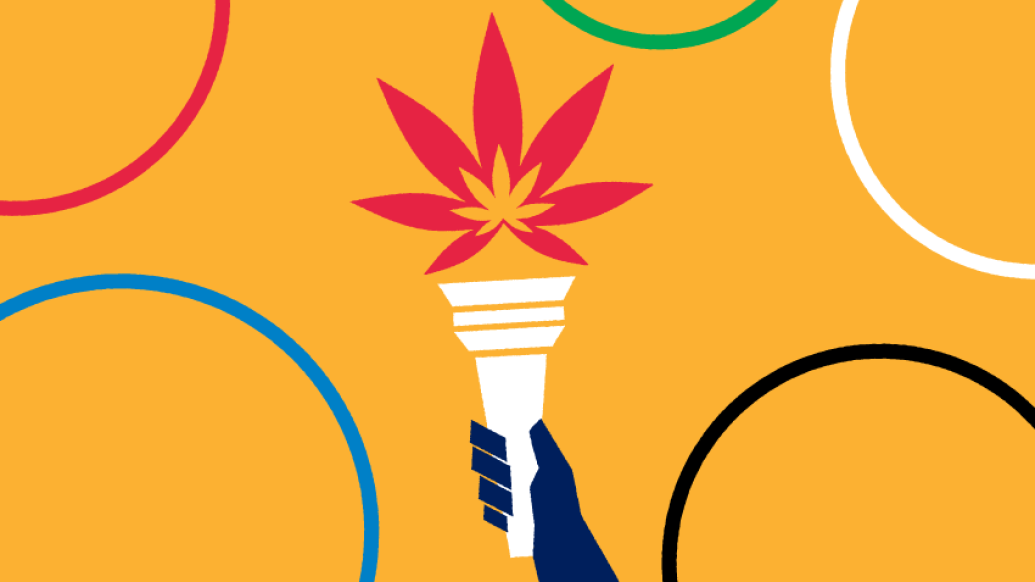A pain expert questions the science behind cannabis prohibition in sports.
3:20 PM
Author |

Track and field star Sha'Carri Richardson's medal-winning hopes were dashed when she tested positive for THC, the main intoxicating compound found in marijuana, disqualifying her from the Tokyo Olympics with a one-month suspension. The uproar that followed the announcement is the latest indication of shifting attitudes around cannabis, as more people, including world-renowned athletes, use cannabis for medicinal and recreational purposes.
Michigan Health Lab talked to pain-management expert Kevin Boehnke, Ph.D., about the decision and athletics and cannabis in general:
The World Anti-Doping Agency prohibits the use of all natural and synthetic cannabinoids except cannabidiol (CBD) during competition. What do you think is the basis of this rule?
The World Anti-Doping Agency published a paper in the journal Sports Medicine in 2011 that cited three reasons for this prohibition. The first reason cannabis is prohibited because athletes who use it allegedly may endanger themselves through slowed reaction times and loss of executive function, and the second reason states that interviews and animal studies have found that cannabis may potentially be performance enhancing. The third reason basically states that athletes are role models and using cannabis is a violation of the spirit of sport.
Reasons one and two are potentially contradictory, as slowed reaction time certainly isn't performance enhancing. Reason three appears to be tied to the War on Drugs policies, which criminalized cannabis and punished people for using or promoting it. This last reason is especially troubling, as these policies pushed a false narrative of extreme cannabis-related harm and were enforced in incredibly racist and societally damaging ways. It also doesn't quite square with current athletic partnerships with alcohol companies, which one might argue violates the spirit of sports due to the known dangers of alcohol (which substantially exceed those of cannabis.)
Like Podcasts? Add the Michigan Medicine News Break on iTunes, Google Podcasts or anywhere you listen to podcasts.
Could cannabis be performance enhancing?
A recent literature review published in 2018 entitled "Cannabis and the Health and Performance of the Elite Athlete" found no direct evidence for cannabis as a performance enhancing drug and noted that future research should investigate potential beneficial use for pain-management and reduction of concussion-related symptoms. Cannabis may also be beneficial for sleep and anxiety. Taken together, these effects may help with recovery from intense exertion and thus be potentially spun as performance enhancing.
That said, other allowed pain relievers or anxiolytic agents are not considered performance enhancing, so disallowing cannabis on that basis is irrational.
CBD is an exception to the cannabis prohibition. What do you make of that?
It's interesting that CBD is permitted. I think some of it is the fact that CBD is non-intoxicating and that the World Health Organization and other international and national organizations are acknowledging CBD as medicine, the natural example being the CBD-containing epilepsy medication Epidiolex. It would be harder to justify prohibiting something that is FDA-approved, de-scheduled under the Controlled Substances Act, and has minimal negative effects. Also, CBD is so widely available that many athletes will use it anyways.
That said, many CBD products may also contain other prohibited cannabinoids like THC, so use of these products is not without risk of disqualification from a positive drug screen.
MORE FROM MICHIGAN: Sign up for our weekly newsletter
What do you think about the future of cannabis and athletics?
Cannabis use is becoming more widely accepted societally, demonstrated by the many countries and states in the United States which have legalized cannabis for medical or adult use. The vast majority of adults in the U.S. support legalizing cannabis for medical or recreational purposes, and the U.S. Senate Majority Leader recently put forth a bill that, if passed, would end cannabis prohibition. So, it seems possible that these outdated, harmful drug policies could eventually be a thing of the past. Even if that doesn't happen federally, athletes and organizations are pushing to overturn athletic prohibition policies.
For example, Eugene Monroe, who played in the National Football League for the Jacksonville Jaguars and the Baltimore Ravens, is probably one of the most famous and one of the people who has really challenged the NFL on this policy. As a result of his advocacy and that of many other players and physicians, the NFL recently put out a call for proposals for studies of alternative pain management strategies, including cannabis.
In short, I think there's a big mismatch between these blanket prohibitionist policies from WADA and USADA and what people are doing, what society is saying, and what we know about cannabis scientifically.

Explore a variety of healthcare news & stories by visiting the Health Lab home page for more articles.

Department of Communication at Michigan Medicine
Want top health & research news weekly? Sign up for Health Lab’s newsletters today!





